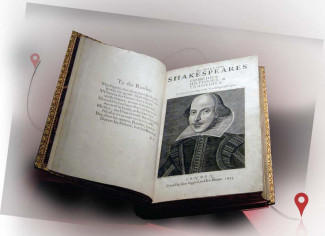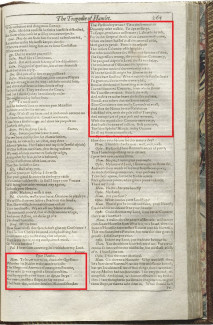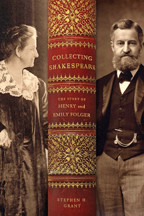
Johns Hopkins UniversityEst. 1876
America’s First Research University
First Folio, the book that gave us Shakespeare: On tour from the Folger Shakespeare Library in 2016

Guest post by Stephen H. Grant
Johns Hopkins University Press released Collecting Shakespeare: The Story of Henry and Emily Folger on the Ides of March in 2014, the 450th anniversary of the Bard’s birth. In 2016, the 400th anniversary of Shakespeare’s death, the most famous and valuable Shakespeare volume––the 1623 First Folio––is on tour to all 50 American states plus Washington DC and Puerto Rico. Eighteen of the 82 copies of the First Folio that Henry Folger purchased are traveling. The institutional hosts were selected after a competitive process marked by 140 inquiries, 101 completed applications, and winning proposals from 23 museums, 20 universities, five public libraries, three historical societies, and one theater. The University of Notre Dame in Indiana opened the First Folio tour on January 4, 2016 and The Parthenon in Nashville, Tennessee will close the tour on January 2, 2017. This link to the Folger gives the information about where and when the rare volume will be displayed.
The tour is an ambitious, complicated, and unprecedented project, made possible in part through the sponsorship of the National Endowment for the Humanities and Google.org. The Folger Library’s partners in organizing it are the Cincinnati Museum Center and the American Library Association.

What is a folio? The word “folio” is a printer’s term, referring to the size of the page, approximately 9 by 13 inches. (A folio-size paper folded in half, is called a “quarto.”) When Shakespeare’s plays were printed individually, they appeared in quarto. When all his plays were posthumously published, they appeared in folio. The First Folio of 1623 is the sole source for half of Shakespeare’s dramatic production. Eighteen of his plays (including Macbeth, Julius Caesar, The Tempest, and As You Like It) had never been printed before and would probably be unknown today without this early compilation. They were offered to the public unbound, with pages uncut. Due to the large-size format of the volume, and the quality of the handmade sheets of rag paper imported from northern France, the sales price was high for the times. While attending the play cost one shilling six pence; the cost of this prestigious book was one pound (twenty shillings), or the equivalent of buying forty loaves of bread. By comparison, Sotheby’s in London sold a First Folio in 2006 for 2.8 million pounds, or the equivalent of buying 125 new automobiles.

The First Folio is the most coveted secular book in the English language and one of the most important books in the world. Shakespearean scholars consider it to be the most authentic version of the Bard’s dramatic output. The original print run was about 750 copies. Only 233 copies of the First Folio are known to exist today. Why did Mr. Folger seek to acquire as many copies as he could? Every hand-printed book is unique. In the 17th century, with hand-set type, sometimes a letter wore out and was replaced. Spelling was not standardized. As many as nine typesetters or compositors worked on the First Folio in the printing shop with idiosyncrasies such that experts can identify which compositor worked on which copy. Many of the copies have marginalia (words, phrases, poems, drawings) added in the margins by avid readers over the centuries. Some assertive readers considered that they could improve upon the Bard’s English and crossed out his words and inserted their own!
STEVE'S FIRST FOLIO TOUR I will next report on the First Folio tour after speaking at two events in Santa Fe later this month. My major Folger talks for the remainder of this year are: New Mexico Museum of Art Talk Friday, Feb. 19, 2016 at 2 PM http://media.museumofnewmexico.org/events.php?action=detail&eventID=2685 Reception by Friends of the Santa Fe Public Library, Feb. 20, 2016 5:30 – 7:30 PM http://www.santafelibraryfriends.org/SpecialEvents.html Stanford University Book Store Talk Wednesday, Feb. 24, 2016 at 6 PM https://events.stanford.edu/events/572/57263/ Marin County Book Passage Talk Thursday, Feb. 25, 2016 at 7:00 PM http://www.bookpassage.com/event/stephen-grant-collecting-shakespeare The Homestead, Hot Springs, Va. Talk Saturday, Mar. 12 at 4 PM http://www.omnihotels.com/hotels/homestead-virginia/things-to-do/event-calendar?trumbaEmbed=view%3Devent%26eventid%3D117806472 San Diego Public Library Talk Wednesday, June 22, 2016 at 6:30 PM 330 Park Blvd San Diego, CA 92101 San Francisco Public Library Talk Thursday, June 23, 2016 at 6 PM Main Library Koret Auditorium, 100 Larkin St. San Francisco, CA 94102

Use promo code "HDPD" to receive a 30% discount when you order your copy of Collecting Shakespeare.


